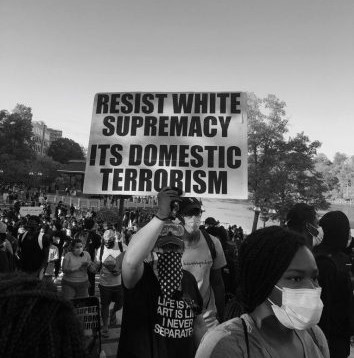How 2020’s Version of White Supremacy Impacts the Black Vote
The Black voter is forced to choose the path of least resistance.

A protester at the “Black Lives Matter” march in Columbia, Maryland.
November 20, 2020
Earlier this year, when the results from the South Carolina Democratic primary were first being reported, I was somewhat shocked. Black voters, particularly those residing in the South, showed up for Joe Biden in a way that I was not expecting. As a young Black person who supported Bernie Sanders, I felt as though my people were voting against their interests. I thought Black peoples’ support of Joe Biden was an extension of their love and clamor for Barack Obama, and in a sense it was, but something more sinister was also at play: the fear of white backlash.
Black people are largely pragmatic voters. A lot of Black voters vote less based on shared ideals or sociopolitical goals, but more so on which candidate white people will most likely accept. In the face of the potential racial consequences of another four years of Donald Trump, Biden is the “safest” pick in comparison to more progressive candidates.
Before Obama was America’s darling, many Black leaders and the community itself were skeptical of the possibility of there being a Black president in America. Black people did not truly throw their support behind Obama until white people, particularly those from majority-white liberal states, began to do so. For a people whose right to exist freely has historically been threatened and trivialized, being able to read the dominant society’s reaction to a particular candidate can be a matter of survival.
I do not say this to act as if Black people are monolithic or condescend towards those whose views differ from mine. Joe Biden would not be the Democratic nominee had he not been backed by Black voters. It was the endorsement from Congressman Jim Clyburn and support from Black South Carolinians that rescued Biden’s faltering campaign. With that said, I cannot readily deny the role that white people play in these political decisions, especially in Southern, conservative settings.
Despite my double-minority status, I do not wonder much about the national election itself; I ponder most about how white people will react to the election. The reaction to Obama was Trump, so what will be the reaction to President-elect Biden’s victory? Keeping in mind American whites’ history of reacting violently to minority social progress, the prospect of white supremacist violence is not so outlandish.
In the post-Civil War Reconstruction Era, emancipated Black people began to advance in a myriad of ways. Black men earned the right to vote, and an estimated two thousand were elected to public office. According to Eric Forner, a history professor at Columbia University, this era of Black progress ended abruptly when, in 1877, President Rutherford B. Hayes “abandoned the idea of federal intervention to protect the rights of Black citizens in the South.” This period was nowhere near perfect. Black advancement was exclusively held for men, leaving Black women to the wayside. But it was one of the only moments in history that America genuinely tried to rectify its past with slavery.
From this point onward, conservatives threatened and trampled upon the voting rights of Black men, quite literally. Lest we forget the Ku Klux Klan, which was active during this time (and still is), used to hang Black people for even attempting to exercise their right to vote. The blood-drenched era of Jim Crow was so heinous that, according to the US Census, “an estimated 6 million Blacks left the South” between the years 1910 to 1970. Some of those very same people that left the South are voting now, in an election where President Trump, in response to a debate question, told the Proud Boys to “stand back and stand by.” Imagine that. Horrifying is not even the word.
A recent study also warns that “five states are at high risk of experiencing election-related armed violence from militia groups,” reports Justine Coleman of The Hill. Let us call a spade a spade, shall we? These are white supremacists and far-right domestic terrorists that have simply traded their white cloaks for camo gear and their nooses for AR-15s.
These are the people Trump is telling to “go into the polls and watch very carefully.” This surpasses simple racist dog-whistling. In September, Christopher Wray, the acting director of the FBI, told the House Homeland Security Committee that the most prominent domestic threat facing America was “racially/ethnically motivated violent extremists (RMVE),” or, in blunt terms, white supremacists.
White supremacy, and the danger it poses to the most vulnerable, has always been a serious threat that often has not garnered the response the issue truly deserves. Exit poll data shows that white men and white women are still mostly supporting Trump. While all of these people may not be vehement racists, they are acquiescent to a racist. And that is a problem. It is particularly a problem right now during an election season that has been mired by conservative attempts to further disenfranchise, suppress, and intimidate the Black vote. I just hope it is not too late to meet the moment, for us and for the sake of the generations to come.






